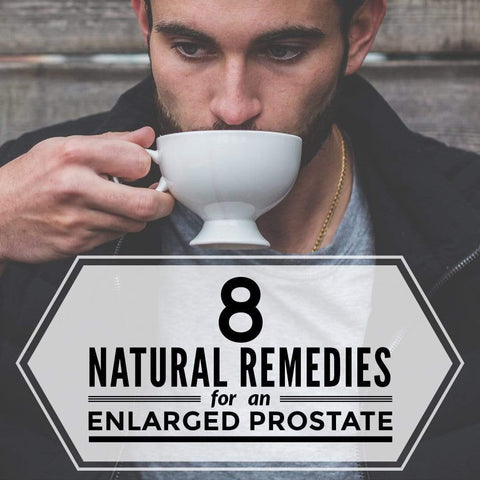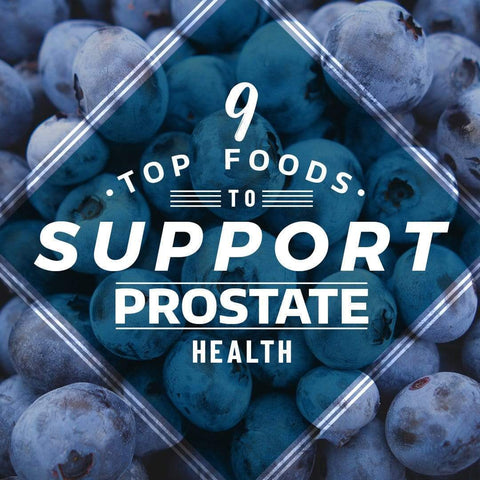
As men get older, many experience issues with their prostates.
Some prostates become oversized. This causes discomfort, difficult urination, leaking urine, interrupted sleep, and reduced sexual function. An enlarged prostate (benign prostatic hyperplasia or BPH) can press on the bladder and cause awkward urinary issues.
BPH is not necessarily predetermined. Our lifestyle and diet hugely affect the health of the prostate. We know the risk factors for both BPH. And the food we eat affects these risk factors in our bodies.
Key Point
Our lifestyle and diet hugely affect the health of the prostate. We know the risk factors for both BPH. And the food we eat affects these risk factors in our bodies.
The main cause of enlarged prostate, or BPH (Benign Prostatic Hyperplasia), is the overproduction of DHT, an especially powerful form of testosterone that causes prostate cells to multiply aggressively. Emerging research also evidences that excessive estrogen may play a role in this overgrowth of the prostate gland.
Here is a list of foods you can eat to support prostate health and diminish your risk factors.
1. Flaxseed

Flaxseed is perhaps the most potent prostate-supporting food you can eat. Research shows that these seeds can have powerful effects against BPH.
Many grocery stores offer various flax-based products like flax milk, flax yogurt, flax muffins, etc. These seeds have the highest source of phytoestrogens in the food kingdom.
Phytoestrogens are evidenced to disrupt the production of DHT 1. And flax specifically is evidenced to reduce 5a-reductase levels 2,3. So when the potent growth
hormone DHT is reduced, the conditions of BPH should be improved because there will be less prostate cell growth.
As expected, the consumption of flaxseed has been shown to reduce various symptoms of enlarged prostates and improve urine flow 4.
The phytoestrogen lignans in flax can actually be measured in prostate fluid after the seeds are consumed, so these growth-inhibiting compounds directly go about their work inside your prostate 6.
Exclusive Bonus! Download the FREE report ‘The Ultimate Prostate Health Cheatsheet’ by clicking here.
2. Tomatoes

Tomatoes contain a carotenoid, lycopene, which has impressive effects against BPH.
In one study,researchers state simply that lycopene “inhibited progression of BPH” 7. The consumption of lycopene improved symptoms of BPH and reduced biomarkers of BPH 7.
Lycopene is best absorbed when tomatoes are cooked.
3. Phytosterols (in plant foods!)

Plant sterols, or phytosterols, are cholesterol-like molecules that exist in small amounts in grains, veggies, fruits, nuts, and seeds. But they are well known for lowering LDL or “bad” cholesterol.
Be sure to include many plant foods in your diet because plant foods are full of these beneficial sterols. This is one of the reasons why vegan diets are thought to be helpful in fighting prostate diseases.
In many clinical trials, supplemental dosing with phytosterols has caused improvement in the symptoms of an enlarged prostate. A review of four clinical trials showed that plant sterols improved urinary flow in men with enlarged prostates 11.
In hamsters fed phytosterols, prostate sizes decreased, and researchers said that 5α-reductase was inhibited 13.
4. Broccoli

Everyone knows that broccoli is healthy. It’s high in vitamin C, helps your liver detoxify, and has numerous other health benefits.
There is evidence that broccoli has effects on the prostate and decreases excessive cell growth that leads to BPH 14. Broccoli has various cell-growth stopping effects 15. For instance, a compound in broccoli can induce cell death prostate cells and inhibits DNA production that is necessary for the duplication of cells 15.
Broccoli can even regulate genetic signals that determine how large the prostate grows 16.
5. Chlorella

This edible algae is one of the most nutritionally-dense foods on the planet. It is packed with vitamins, minerals, and protein.
Chlorella also contains one of the most powerful antioxidants in the world: astaxanthin.
Low levels of astaxanthin can halt DHT production, reducing the levels of a hormone that contributes to prostate cell growth 17.
Animal studies have also shown the inhibition of prostate growth due to astaxanthin ingestion 18. And more good news is that astaxanthin is very bioavailable. It is absorbed throughout your body so it can do its work in your cells.
6. Blueberries

Researchers believe that berries help fight prostate growth in multiple ways 19. They downregulate factors that help it grow such as inflammation and angiogenesis (the process of tumors creating blood vessels to nourish themselves) 19. Researchers also believe that blueberries can help with enlarged prostate because the antioxidants in blueberries might help decrease excessive cell growth 20.
7. Brazil Nuts

Add a few brazil nuts to your diet a few times a week to get a nice dose of selenium and zinc. Selenium is necessary for the production of one of the most important antioxidants in the body: glutathione 21. Glutathione helps prevent free radical damage to the prostate.
Those with prostate diseases have lower levels of zinc in their blood and tissue 22. Don’t overdo brazil nuts, though, because they contain so much selenium that you could be getting too much if you're pounding back tons of them each day. Two brazil nuts a day is enough.
8. Green Tea
Along with the innumerable benefits of green tea, this feel-good plant may improve prostate function.
Green tea can inhibit 5α-reductase and block DHT receptors, inhibiting the action of this hormone 23. Both green and black tea improved a number of BPH symptoms in men 24. Extracts increased urinary flow, sexual function, inflammation, and emptying of the bladder 24.
Researchers think that green tea can help prevent prostate disease as well. Green tea stimulates DNA repair and prevents DNA damage in humans, so it might lessen the chance of disease development 25. Green tea has been shown in animal, in vitro, and in human studies to have disease-fighting properties 26.
Drinking organic green tea and taking supplemental green tea extracts will help prostate health , but it’s important not to take high doses of these extracts, lest they become toxic. Moderation is key!
9. Saw Palmetto Berry

Saw palmetto is perhaps the most popular and assured remedy for enlarged prostates and is an extract of the fruit of a palm plant that grows in the southeastern United States.
The main action of this herb is the inhibition of 5α-reductase. Test tube studies have shown that saw palmetto can block the “active site of the enzyme” 27,28. Saw palmetto has shown improvement in prostate symptoms in human studies and has lowered prostate-aggravating inflammation 27. In rat prostates, saw palmetto has inhibited the action of DHT 27.
Additionally, there are three other benefits of saw palmetto. First, it is safe and well tolerated in humans 27. Second, it may help improve sexual dysfunction, which can be exacerbated by the other treatment option: anti-DHT pharmaceutical drugs 29. Third, researchers believe that this herb is bioavailable, meaning that it can be absorbed into the prostate where it needs to go to provide therapeutic benefits27.
In 2001, researchers seemed to confirm the effectiveness of saw palmetto supplementation in humans. biopsies were taken of the prostates of men who had supplemented with saw palmetto for 6 months and “ tissue DHT levels were reduced by 32%” 30.
Eat for Your Prostate
Don't think for a second that food doesn't affect the health of your prostate. What you eat can have a tremendous impacton whether you develop BPH. What you eat can also affect your prognosis with these diseases. So make your prostate healthy by eating the right foods. You will live a much happier life if you do!
Are you concerned about your prostate health?
Would you like an easy way to maintain proper prostate health at any age?
The good news is Nutritionist Evan Burns has just released his FREE prostate health cheatsheet, which reveals everything you need to know from signs and symptoms of an unhealthy prostate to foods and natural remedies for improved prostate health, it’s got you covered.
He even provides answers to the top prostate health questions that most men are too embarrassed to ask their doctors about.






